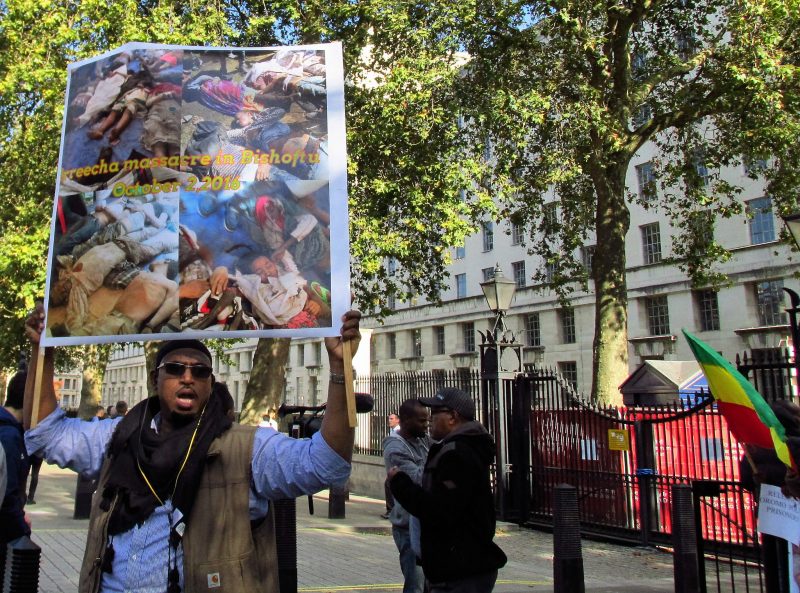 [1]
[1]An October 2016 protest in London by Oromo people over killings and human rights abuses at the hands of the Ethiopia government. Photo by Flickr user David Holt. CC BY 2.0
The Ethiopian government's Human Rights Commission has declared [2] that 669 people were killed during the uprising of 2016, a figure that is significantly lower than other numbers reported by Human Rights Watch [3] and Amnesty International. [4]
The unveiling of the report took place on April 18 in a parliament that is completely controlled by the government. Addisu Gebregziabher, the head of the Ethiopian Human Rights Commission, read out [5] the commission’s main findings to Ethiopian parliament, which placed the burden of responsibility for the bloodshed largely on opposition groups: “The violence happened because protesters were using guns and security forces had no other options”. Gebregziabher said the “negligence” of security forces was also a contributing factor, albeit a minor one.
Several human rights organizations, however, have reported [6] that it was largely security forces firing on unarmed demonstrators.
Until the movement was subdued in October 2016, when Ethiopia declared a state of emergency, thousands had been demonstrating across Ethiopia. The protests began in April 2014 in Oromia, the largest of nine ethnically federated states, against a plan to expand the territorial limits of Ethiopia's capital, Addis Ababa, into neighboring Oromia villages and towns [7]. The Oromo people have historically been persecuted by those in power in Ethiopia, and the plan was viewed as yet another encroachment on their rights. Over the following months, the protests expanded [8] into other states, with participants rallying behind broader grievances against the government.
The government responded brutally; according to Amnesty International, at least 800 [4] people were killed, while opposition groups and activists put the figure in the thousands [9].
The report as told by Gebregziabher blames opposition groups, diaspora-based satellite television stations, particularly Oromo Media Network, [10]and social media for exploiting the prevailing “lack of good governance” in Ethiopia to stir violence.
The long-awaited report of the Human Rights Commission's investigation is not available on its website [11]; the state-affiliated Fana Broadcasting Corporate did not provide a link to it in their news report [12] either. However, Al Jazeera has embedded [5]a video that shows Gebregziabher’s presentation in parliament. Most of the news reports are based on the summary that was presented for the parliamentarians, which focused largely on the number of people killed and the losses to property.
The news reports did not indicate if the commission’s report addressed torture, arbitrary detention, and poor prison conditions. International organizations like Human Rights Watch, Amnesty International, and Freedom House often point to evidence that shows these issues are rampant in Ethiopia. Similarly, the Ethiopian Human Rights Council [13], the only independent local human rights organization in the country, has also reported their prevalence.
But concrete information about torture, arbitrary detention, and prison conditions have been elusive in past reports [14] from Ethiopia’s Human Rights Commission.
Seyoum Teshome, who himself spent [15] at least four months in prison during the protest, wrote [16] in response to the report: “God Save Us from Subservient Human Right Commission that intimidates the public”.
A day before the release of the report, Ethiopian officials rejected [17] requests by the United Nations and the European Union to send independent investigators to consider the alleged human rights violations. Speaking to BBC Africa, Ethiopian Prime Minister Hailemariam Desalegn said [18] Ethiopia has independent institutions that can do such investigations on their own.
However, a closer look at the chairperson of the Ethiopian Human Rights Commission Addisu Gebregziabher reveals that he has substantial ties [19]to the government and a significant interest in maintaining the status quo. Previously, Gebregziabher held posts in the Ministry of Federal Affairs and was a deputy chair of the Ethiopian National Electoral Board that supervised the May 2015 parliamentary election, which was won by the ruling party, the EPRDF. The opposition complained [20] of irregularities during and in the lead-up to that vote.
Since November 2015, Ethiopia has followed a devastating cycle of protests and repression [7]. The country's Human Rights Commission published the findings of a similar investigation last June [14], but in it those responsible for the killings were not held to account, and protests abated only in October 2016 when authorities declared a state of emergency. With Ethiopia’s prisons full of political [21]opponents, the latest report will likely only deepen the impasse if it also fails to address the root causes of the discontent.